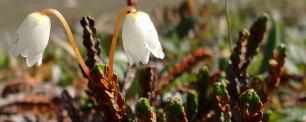StoiCa
Resilience of stoichiometry in subartic soils under temperature-induced Carbon losses: where does the Nitrogen go?
Revealing the effect of the global warming on the nitrogen cycle on subarctic soils
Global warming can trigger enormous releases of carbon (C) from soils, with positive feedbacks to climate change. Northern high latitude soils can constitute a major contributor to this positive feedback loop. Climate change predictions are however still largely uncertain, partly due the lack of accurate representation of vegetation and soil microbial feedbacks and C and nitrogen (N) interactions.
Warming enhances microbial mineralization of soil organic matter –i.e. soil C outputs– to a higher degree than vegetation productivity –i.e. soil C inputs–, resulting in large C losses from northern soils. Pioneer results point to proportional N losses in response to warming, which may be the key to this phenomenon.
This project will combine the expertise of a multidisciplinary group of researchers on ecosystem stoichiometry, stable N isotopic methods and applied biotechnology with the existence of unique and established research sites in geothermal systems in Iceland to reveal the fate of N lost in response to warming, and uncover the mechanisms behind observed soil C losses. StoiCa will elucidate, for first time, three key knowledge gaps: (1) the rates, forms and mechanisms of N losses from arctic soils under warming; (2) the transient- and persistent responses and the warming-induced transitions from a closed to a leaky, open N cycle; and (3) the shifts towards a more symbiotic N cycle and role of thermo-adapted mycorrhiza in stimulating plant growth.










